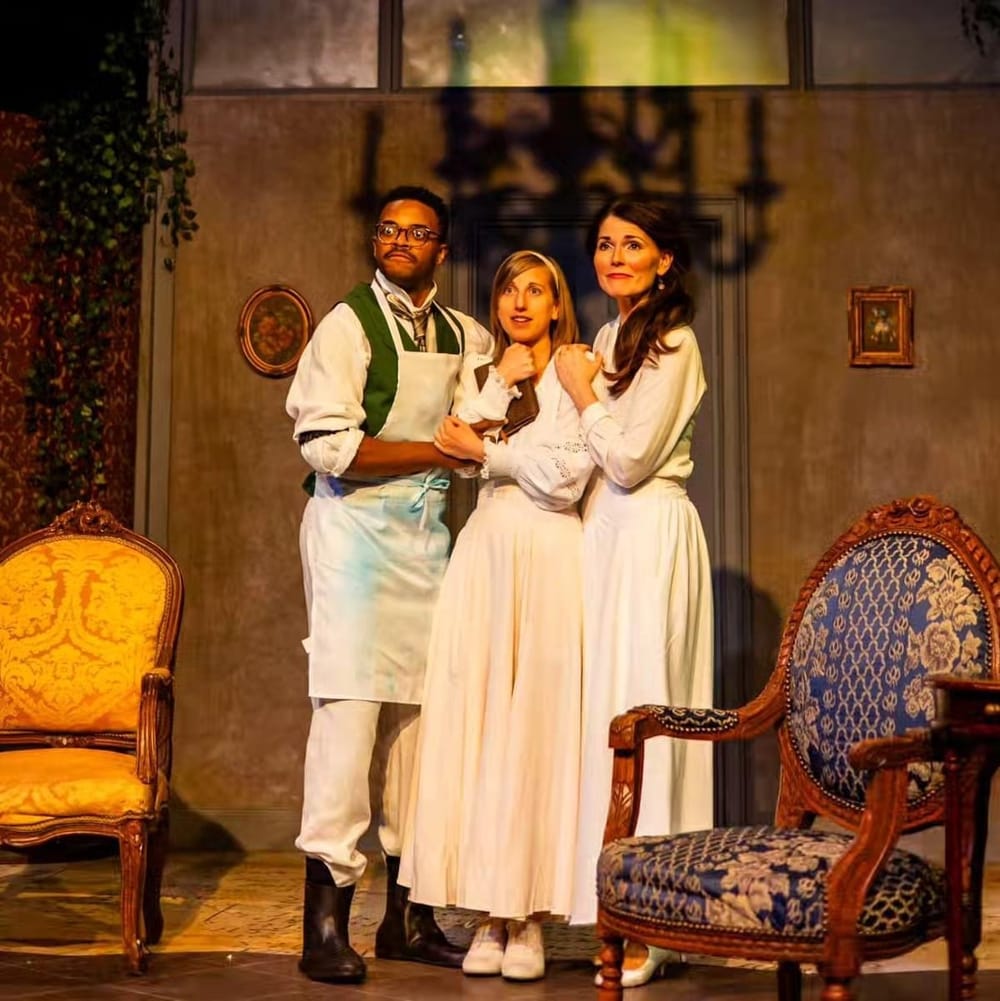Stay in the Loop
BSR publishes on a weekly schedule, with an email newsletter every Wednesday and Thursday morning. There’s no paywall, and subscribing is always free.
The Russian Revolution resonates in the US today
Philadelphia Artists’ Collective presents Maxim Gorky’s Children of the Sun

The only real misstep during the Philadelphia Artists’ Collective’s enthralling, utterly chilling revival of Maxim Gorky’s 1905 play Children of the Sun, adapted by Andrew Upton and now at the Bluver Theatre at the Drake, is the anachronistic inclusion of the song “Believer” by Imagine Dragons—the paranoia of Radiohead’s “Burn the Witch” would’ve been a better fit. Considered a radical socialist, Gorky wrote Sun while imprisoned in St. Petersburg during the Russian Revolution of 1905. Famously, when one scene at the premiere felt all too familiar to audiences, they panicked, and an actor had to reassure the crowd. I know contemporary viewers’ hearts may, at the very least, skip a beat during the chaotic third act.
Gorky set Children of the Sun in 1862, shortly after the emancipation of the serfs and in a period of social and economic reform for Russia. However, a cholera epidemic is still rampant in the village of Professor Pavel Protasov (Newton Buchanan), who believes that in his research, he is “uncovering the secret of life.” The scientist and researcher views actual life, love, and the conflicts in his house largely as a distraction from this. He learns far too late how much his work intersects with the challenges and changes happening within the Protasov household.
Embittered veterinarian Boris Chepurnoy (Damon Bonetti) wants to marry Pavel’s ill, tormented sister, Liza (Cassandra Alexander), and Pavel’s wife Yelena (Jessica DalCanton) spurns the advances of their artist friend Dmitry (Eli Lynn). Meanwhile, servant girl Feema (Kelsey Hébert) considers her few options for social advancement, including the desires of worker Roman (Frank Jimenez) and landlord Nazar (Eric Mills), even as their employer unwittingly poisons the town. Did I mention that Boris’s sister Melaniya, played with gusto by Madeleine Claire Garcia, is in love with Pavel as well?
Humanity, heart, and real dramatic fever
What’s impressive is how the play savagely satirizes Enlightenment principles, as well as the self-indulgence of the Russian petit bourgeois, without ever turning them into caricature. Gorky was a leftist, but he eventually distrusted the Bolsheviks after the 1917 Russian Revolution, and his interest is in dramatic nuance though the more educated characters naturally talk in polemics.
For all of the bourgeoisie pedigrees and advantages, as in The Seagull, emotional communication is nearly null, and these would-be lovers often break one another’s hearts. The cast, as well as Megan Bellwoar’s direction, invests so much emotion into each silent, stunned revelation. Gorky captures their humanity but is never too forgiving of these privileged few. As Pavel, Newton performs his monologues about reason and slow progression with real dramatic fever, so certain that the mysteries of the human heart are nothing compared to scientific discovery. What the Cassandra-like Liza tries to impart, as she reads newspapers, nearly supernaturally affected by the suffering just outside her home, is that Pavel’s entitlement and focus come at a human cost.
Essential viewing for 2024 Americans
Children of the Sun was originally a period piece alluding to Russian events of its own era. Americans still dealing with the Covid-19 pandemic and an increasingly turbulent present, though, will easily see their own country in the play’s depiction of social inequality, isolation, and eventually, violent change. They may also understand the tonal shift as the story moves into rousing, blood-curdling tragedy, given that a similar sense of dread and fear has hit America over the past decade. In the small black box of the Bluver, where the boundary between audience and actor can feel porous, this made the last 20 minutes absolutely riveting, even terrifying.
The Philadelphia Artists’ Collective’s production of Maxim Gorky’s play is essential viewing right now for many reasons, whether the ensemble cast, the intensity of the rapid-fire dialogue, or the intimacy of the experience. But it’s the sheer catharsis of the ending, and the way it captures how it must have felt in Russia circa 1862/1905, and how it feels in the United States circa 2024, that is truly worth the ticket price.
At top: Newton Buchanan, Cassandra Alexander, and Jessica DalCanton in PAC’s Children of the Sun. (Photo by Wide Eyed Studios.)
What, When, Where
Children of the Sun. By Maxim Gorky, adapted by Andrew Upton; directed by Megan Bellwoar. $15-$35. Through May 19, 2024, at the Bluver Theatre at The Drake, 302 S Hicks Street, Philadelphia. philartistscollective.org.
Accessibility
The Drake is a wheelchair-accessible venue with gender-neutral restrooms.
Sign up for our newsletter
All of the week's new articles, all in one place. Sign up for the free weekly BSR newsletters, and don't miss a conversation.
 C.M. Crockford
C.M. Crockford